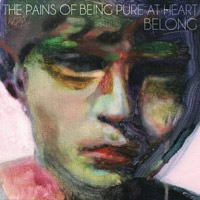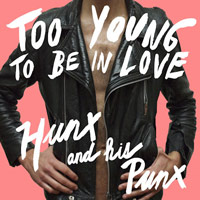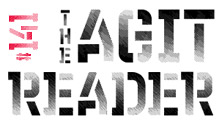
Belong
Slumberland/Collective Sounds
Perhaps in an effort to keep from repeating themselves like peers like, say, the Vivian Girls, the Pains of Being Pure at Heart enlisted the production team of Flood (U2, Depeche Mode, 30 Seconds to Mars) and Alan Moulder (The Jesus and Mary Chain, My Blood Valentine, A Perfect Circle) to work on the follow-up to their superb self-titled debut. It’s a gutsy move for a bunch of kids whose greatest influences (The Pastels, Talulah Gosh, etc.) are known for production as elementary as the pop songs they created, a move that I’m not convinced was entirely necessary.
The difference between Belong and its predecessor is immediately noticeable on the lead-off title track. Here the band’s aesthetic has been recreated in sharp relief—fuzzy guitars, shimmery choruses and crisp beats all given greater definition. With all the inherently catchy elements of the Pains’ formula still in place, it’s not a bad song by any means, but the Brooklyn band—like their heroes—was also attractive for the sheepishness inherent in its debut. A certain amount of that reticence can still be heard in “Heart in Your Heartbreak” and “Anne with an E,” and the sparkling keyboards on “The Body” are a welcome addition. But I’m afraid that with this album the Pains have lost their innocence, and with it, some of their charm.
Stephen Slaybaugh

The New Theory of Everything
Happy Jack Rock
Amidst a now never-ending reunion of the classic Guided By Voices line-up and the healthy clip cranked through Boston Spaceships (not to mention a streak of increasingly lucid solo albums), Robert Pollard can’t possibly have time to create fantasy situations for one-off collaborations with guys who were once his mentors (or imaginary peers), can he? Fortunately he does. And while many times the results of his song hand-offs to forgotten indie autuers (Tommy Keene, Richard Davies) are frivolous at best, for Mars Classroom Pollard constructed an effectively copacetic trio with Gary Waliek (of Big Dipper and occasionally of the Volcano Suns), who produced the entirety of the record, and Robert Beermen (drummer for anecdotal ’90s instrumental band Pell Mell). Much of the album showcases the bright, jangle and carefree pop-psychedelia of Waliek’s main gig, lending to a sublime meeting of the minds sure to bring the nostalgia for past glories to a fever pitch. This is especially true on the title track which leads off the album, a breezy and shambling mid-tempo convergence of Waliek’s precise vision for what a Guided By Voices hit should sound like in 2011 and Pollard’s effortless harmonies.
The album plays like Under the Bushes, Under the Stars, if that album was influenced more by the Paisley Underground than Dayton’s drive-throughs. It’s a bit eerie to hear Uncle Bob wrapped in dynamics that are this similar to the mood and energy he achieved back then, the songs sounding like some lost tracks from those halcyon days kept in a time capsule, meant to eventually be in heavy rotation on the Gem City’s famed WTUE. Above all else, Pollard has always wanted the storied classic rock band at his back, and Waliek’s complex arrangements provide the perfect framework for this to occur. Nonetheless, songs like “Lumps” and “(It’s Good to Be) Bug Boy” are heavily indulgent, to the point of showing off, but also highlight Waliek’s challenging bouts with prog and mellifluous psychedelia. At times, I wouldn’t bat an eye if you told me Todd Rundgren was involved. The finest measure of this collaboration is “There Never Was a Sea of Love,” which renders Pollard at his most expressive and seemingly vulnerable, as shown in lines like, “The Devil and a detour arrow, Cassavetes to your Mia Farrow.” Waliek likely first heard a boombox recording of Pollard on acoustic guitar, but the song is now devoid of feedback and tape hiss, instead soaked with weeping strings. The extra layer of sonic insulation Waliek adds to Pollard’s songs is more warmth than anything. It’s nice from the outset knowing Pollard has been treated to a different environment to enable his songs to shine. Let’s just hope he sees the light enough to know this shouldn’t be just another one-off, snail-mail partnership, and instead something that should be allowed room to grow.
Kevin J. Elliott
MP3: “Wish You Were Young”

Too Young to Be in Love
Hardly Art
Maybe Hunx and His Punx don’t fit neatly into the “pizza punk” ghetto (because, well, they don’t sing about pizza). However, given the Oakland band’s unwavering and seemingly unabashed commitment to the sounds and teenaged naivety of rock’s golden era, it’s undeniable that Hunx and company bear more than a passing similarity to bands of the sub-genre, especially ones like pizza-punk gurus Personal and the Pizzas. And as with other pizza-punk bands, there’s going to be listeners out there who will immediately dismiss Hunx and His Punx as mere frivolity.
But the late ’50s/early ’60s era rock that Hunx taps into was always more about embracing that unquantifiable teenage energy than taking anything seriously, and even though some critics might waste a little too much time analyzing Too Young to Be in Love’s “boy singing love songs to another boy” lyrics, it would be missing the point to expect anything more than a good time from the Punx. Much of the record—which is Hunx’s first proper album (last year’s Gay Singles LP was a compilation)—sounds like a twee verison of the Ramones doing girl-group covers. And while the sound is at times reminiscent of Hunx compatriot Nobunny, the pop-rock songs on Too Young come off less gunky and more sugary sweet as Hunx’s alternately disaffected and sing-song vocals weave in and out of tandem with the female backing vocals and a clean one-two punch of guitar and organ provides the fuel to keep the party going. Sure, this isn’t rocket science, but there are some gems waiting to be found here, and a little bit of fun never hurts.
Ron Wadlinger
MP3: “Too Young to Be in Love”

Flora
The Kora
Following on their excellent sophomore release, 2009’s Trilogi (it was comprised of three previously released EPs), Sweden’s Fredrik has crafted a similarly intricate mix of electronic and organic sounds for their new album, Flora. Originally a collaboration between Fredrik Hultin and O. Lindefelt, the duo has since expanded to a trio with the addition of Anna Moberg. Moberg seems to be of the same synchronized mindset, though, as Flora is a tightly wound and elaborate piece of sound and mood.
Fredrik has been described as “electro-folk,” but that description only works as far as denoting the division of components comprising their output. Each track here is aswirl in sounds both natural and electronic—it’s often hard to differentiate which is which—and I think it’s safe to say that the group is more concerned with creating something entirely new rather than merely reinvent old traditions with modern tools. Múm would be the closest comparison, with songs like “Vattenfront” and “Caleido Kalahari” coming off equally otherworldly while also sparkling with pop resonance. Tracks such as “Rites of Spring” bare passing resemblance to modern pop, but are inflected with textures foreign to that vernacular. Indeed, with each album Fredrik comes closer to completing their own sonic realm, one where all sounds amount to wondrous curiosities.
Stephen Slaybaugh
MP3: “Rites of Spring”

Apocalypse
Drag City
Sticking to a minimalist aesthetic, Bill Callahan has nonetheless amassed a body of work with a good degree of subtle variance. On his most recent albums, he’s avoided subterfuge, instead surrounding his distinctively bone dry croon mostly with just light touches of guitar. His last album, 2009’s Sometimes I Wish We Were an Eagle, was an understated masterstroke, with Callahan creating a bevy of elegiac pop songs. It was a career highlight and seemed to have signaled a late-career renaissance.
With Apocalypse, the Austin-based songwriter has stuck to his idiosyncratic ways. In many aspects, the album more closely resembles the records he made before dropping his Smog nom de plume for his birth name. The lead-off “Drover” ventures between rustic acoustic strumming and waves of electric vibrato, Callahan telling a first-person cowpoke tale in between. “Baby Breath” more closely hints at the wordplay that has marked his best songs, alien platitudes mingling with common phrases. “America!” and “Universal Applicant” are less successful, with Callahan’s threads of thought becoming tangled either musically or lyrically. Still, one gets the sense that even if Apocalypse is just a bridge to something else or a complete thought on its own, there is plenty left to come from Callahan.
Stephen Slaybaugh
MP3: “Baby’s Breath”
ALBUM REVIEWS
Baby Dee, Regifted Light
Those Darlins, Screws Get Loose
Funeral Party, The Golden Age of Knowhere
Obits, Moody, Standard and Poor
The Strokes, Angles
Generationals, Actor-Caster
Davila 666, Tan Bajo
Keren Ann, 101
Darlings, Warma EP
J Mascis, Several Shades of Why
New York Dolls, Dancing Backward in High Heels
Rise Against, Endgame
Hype Williams, One Nation
Exene Cervenka, The Excitement of Maybe
